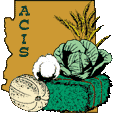 |
|
|
|

|
|||
| |
|||
An extremely valuable piece of equipment in a plant disease management toolbox is the built-in resistance or tolerance to plant pathogens found in many types of plants. By definition, resistance is the ability of a plant to exclude or overcome the effect of a plant pathogen, such as a bacterium, fungus, virus or nematode, whereas tolerance is the ability of a plant infected by a pathogen to grow without dying or sustaining serious injury or yield loss. Resistance is not an all or nothing condition, but ranges from its highest level, immunity, through degrees of useful resistance to a level of nonexistence, when a plant is totally susceptible to a particular pathogen. If available, it is wise to consider growing cultivars with known resistance or tolerance to one or more of the diseases of concern for that crop, as this disease management tool will be active in the plant for its lifetime. Building disease resistance or tolerance into plants is an ongoing activity of plant breeders, using classical as well as modern genetic manipulation techniques to achieve this goal. To contact Mike Matheron go to: matheron@ag.arizona.edu.
|
|||
| Back | |||
For questions or comments on any of the topics please contact Marco Pena at the Yuma Agricultural Center. |
|||
| Home | Cotton
| Veggies | Forages
| Grains | Citrus
| Crop x Crop Insects | Diseases| Weeds | Pesticides | Economics | News | Weather | Research | Photos | Contacts | General Info. Copyright © 2001 University of Arizona, College of Agriculture and Life Sciences Webmaster: Al Fournier (acis@ag.arizona.edu) |
|||